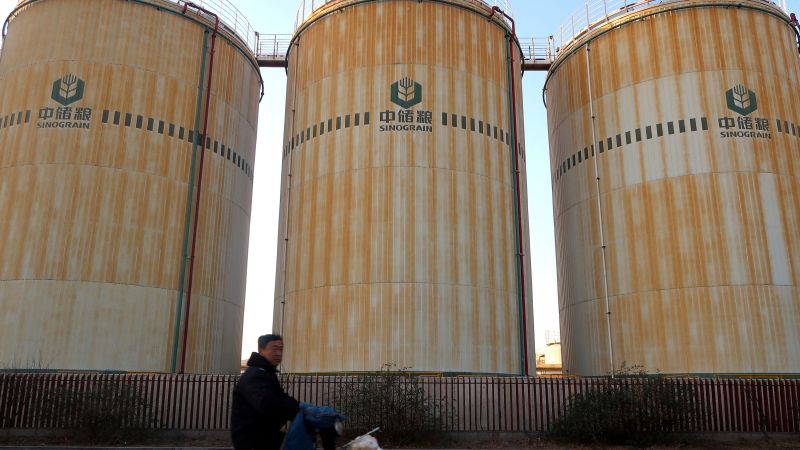Public outrage is mounting in China over allegations that a major state-owned food company has been cutting costs by using the same tankers to carry fuel and cooking oil – without cleaning them in between.
The scandal, which implicates China’s largest grain storage and transport company Sinograin, and private conglomerate Hopefull Grain and Oil Group, has raised concerns of food contamination in a country rocked in recent decades by a string of food and drug safety scares – and evoked harsh criticism from Chinese state media.
It was an “open secret” in the transport industry that the tankers were doing double duty, according to a report in the state-linked outlet Beijing News last week, which alleged that trucks carrying certain fuel or chemical liquids were also used to transport edible liquids such as cooking oil, syrup and soybean oil, without proper cleaning procedures.



Through workers councils and vanguard parties that govern the country.
That doesn’t preclude any one person from accumulating more currency than another.
He doesn’t control it. He administers it on behalf of the workers’ state.
If you read the whole book, rather than panicking at being handed a single chapter, you’ll know more
Now that’s just nonsense:
https://en.wikipedia.org/wiki/Zhong_Shanshan
He literally earned $5 billion in one day and became the sixth-richest person in the world because his company became publicly traded.
https://web.archive.org/web/20210115223106/https://www.forbes.com/sites/jenniferwang/2021/01/05/chinas-bottled-water-mogul-gains-5-billion-in-one-day-becomes-worlds-sixth-richest-person/?sh=7872f8b6792d
Entrepreneurship and buying and selling stocks, publicly traded companies… Things China didn’t have for decades back when it was apparently less communist (who knew Mao was so non-communist), but which the U.S. also has now.
Once again, sure sounds like the U.S. is just as communist as China.
But hey, I’m sure the fewer than 300 billionaires in China with their over $4 trillion in wealth back in 2020 have distributed it all to the workers now, right?
https://www.cnbc.com/2020/10/20/chinas-billionaires-see-biggest-gains-ever-fueled-by-ipos.html
Or is hoarding wealth also a big part of what makes a country a communist one?
That’s how strong federal governmental systems work.
He didn’t earn anything. He benefited from a sudden upward swing in speculative asset prices.
https://www.marxists.org/archive/marx/works/1894-c3/ch25.htm
PLEASE READ MARX
I’ve read Capital and the Communist Manifesto, which is why I know that billionaires who hoard money and own controlling interests in publicly traded corporations is a feature of capitalism, and also why I know that China didn’t used to have such things.
But to hear you and others tell it, China was more capitalist under Mao than it is today.
Then you should already be familiar with ficticious capital and know better than to claim someone “earned $5B” in the middle of a speculative asset bubble.
Neither Nongfu Spring beverage company nor Beijing Wantai Biological Pharmacy Enterprise are SOEs. Which Chinese billionaire owns a controlling interest in a Chinese SOE?
Oh, right, a communist country is one where there are non-state owned enterprises that people can get rich investing in.
Generating capital is definitely a feature of communism as long as it’s fictitious capital. That’s why Donald Trump is a communist.
Again, I implore you to actually read Marx. “Communism is when nobody owns a toothbrush” is just neoconservative propaganda. This isn’t what any AES state practices, much less what the more academic types believe.
Nothing precludes you from generating ficticious capital in a communist system. Marxists simply recognize it as such, rather than deluding themselves into believing material value has been created when speculative asset prices rise.
Again, I’ve read Marx and you’re putting words in my mouth.
And again, Marx did not in any way advocate for an aristocracy that own private capital (call it fictitious if you like, China does not) and run publicly traded corporations where the workers do not own the means of production. That was literally everything he was fighting against.
There is simply nothing communist about an aristocracy. You can say “read Marx” all you like. Marx was 100% against such things. I know because I read Marx.
By the way, some of those private companies are real estate companies that rent property to Chinese workers for a profit. And if I just read Marx, I’ll know he was in favor of such arrangements.
I’m sure Marx would never write anything like:
That’s clearly some Westen imperialist capitalist scum who thinks that way.
He recognized feudalism as a stage of development. That’s very different from advocating for it.
You will routinely see Western imperialist capitalist scum furious over China’s domestic ownership rules. Foreign investors can’t have a majority stake in Chinese firms. Foreign patents have to be legally shared with domestic universities and labs. Foreign real estate firms can’t have primary claim on domestic real property. Chinese protectionist policies guarantee Chinese citizens reap the benefit of domestic investment.
That’s the core logic of Socialism, a pivotal post capitalist step that Karl Marx describes and you can learn about IF YOU READ HIS WORKS.
And it is being done within the context of Chinese history and geographic potential. One might even describe it as “Socialism with Chinese Characteristics”